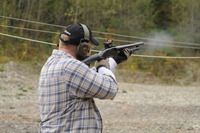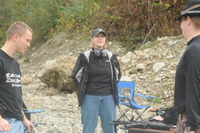






My name is David Robins: Christian, lead developer (resume), writer, photographer, runner, libertarian (voluntaryist), and student.
This is also my son David Geoffrey Robins' site.
Thanks to everyone who showed up and helped out. The day began at 12:30pm with Richard teaching safety guidelines and handling techniques. We had a break to give an interview with KIRO 7 and the Seattle Times. After that, we continued our meeting with Richard leading the discussion on legal issues, ramifications, and several case studies of self-defense scenarios. Overall, yesterday was a great forum in raising our awareness of gun rights and safety, and ended with us shooting at the range. Special thanks to Black Dawg for their pro-bono training and Champion Arms in Kent for hosting us.This is what I sent to msgun Monday:Next time, we will try to have an event closer to campus. If we had one on campus, there would definitely be a large turnout but we would all have to go unarmed because of the regulations there.
I attended—free training, not too far way (~30 mins), what's not to like?, plus I wanted to meet some of the people in the group.The session Sunday got the group some better coverage; the image now should be of a group of serious people armed and able to protect themselves and others from grave bodily harm. DVDs finished: Butterfly Effect: Revelation, Harry Potter and the Sorcerer's Stone, Harry Potter and the Chamber of Secrets.First, the group has indeed toned down. There was some hare-brained scheme proposed in the Facebook group to cruise around with a "decoy" wearing an iPod and several other shadowy figures with nonlethal weapons ready to pounce, so I did my best to shoot that down (no pun intended) and point out its many flaws (you're not the police, you're not trained, if you're in fear of grave bodily injury you don't want to bring anything less than deadly force, you could be hurt/killed, you could hurt someone else, jail, civil court costs, even with a "good shoot", etc.). The original poster agreed that his was a foolish idea.
Second, this training outfit looked legit—Rick Walker (http://www.blackdawgpartners.com - not the most pro site in the world though) is a class act and knows his stuff, ex-military (weapons expert), certified as instructor by several reputable groups, etc. He teaches various courses including the Utah permit course. He went over some basics of weapons and CCW with a PowerPoint deck in a classroom at Champion Arms (they offered the room free)—starting from Cooper's 4 rules, then things like where you may or may not carry, Castle doctrine, reacting to scenarios—run if you can, call 911 if you're not in immediate danger; importance of practice; all stuff I've seen but nice to have it all in one place. He went over some cases, what people did, what they were convicted of, and their civil costs. I can reproduce the quiz he passed out before the class and discussed if people want. I believe it was sufficiently sobering to cause the "Defenders" to change their course, which is great:
more armed good guys on the streets that know the law and practice with their particular defense weapon is a good thing .I also talked to him about doing training for a Microsoft group; he said he could do something similar (a basic CCW class) for just cost of gas and materials; perhaps if we were interested he could give us a rate on doing a Utah permit course or something else for those interested.
At an irreducible minimum, Art. III requires the party who invokes the court's authority to "show that the personally has suffered some actual or threatened injury as a result of the putatively illegal conduct of the defendant," Gladstone, Realtors v. Village of Bellwood (1979), and that the injury "is likely to be redressed by a favorable decision," Simon v. Eastern Kentucky Welfare Rights Org. (1976). … But the "cases and controversies" language of Art. III forecloses the conversion of courts of the United States into judicial versions of college debating forums…. The exercise of judicial power, which can so profoundly affect the lives, liberty, and property of those to whom it extends, is therefore restricted to litigants who can show "injury in fact" resulting from the action which they seek to have the Court adjudicate.The court claimed that this case was different from Flast because:
Unlike the plaintiffs in Flast, the respondents fail the first prong of the test for taxpayer standing. Their claim is deficient in two respects. First, the source of their complaint is not a congressional action, but a decision by HEW to transfer a parcel of federal property. Flast limited taxpayer standing to challenges directed "only [at] exercises of congressional power." See Schlesinger v. Reservists Committee to Stop the War [1974] (denying standing because the taxpayer plaintiffs "did not challenge an enactment under Art. I, § 8, but rather the action of the Executive Branch").Some precedents are perhaps better observed in the breach than in the observance, including this "test for taxpayer standing." The fact that the originating act was executive in nature does make the court any less able to rule on it if it violates the Constitution. Any taxpayer should have standing in any case involving the smallest amount of their money (despite the inconvenience to the court), and the presumption should be that spending less will redress the wrong by lowering taxes by the amount saved (even though in practice government tends to spend anything "saved.") While there are more egregious violations, stopping this gift of taxpayer money and requiring the government to sell the property for fair market value (and better still, remit the increase as at least a token tax reduction) would have set valuable positive precedent.Second, and perhaps redundantly, the property transfer about which respondents complain was not an exercise of the authority conferred by the Taxing and Spending Clause of Art. I, § 8. The authorizing legislation, the Federal Property and Administrative Services Act of 1949, was an evident exercise of Congress' power under the Property Clause, Art. IV, § 3, cl. 2. Respondents do not dispute this conclusion, and it is decisive of any claim of taxpayer standing under the Flast precedent.
grabber - given a search spec, such as "House S06E05", query isoHunt and return good torrents (removing listings with poor scores, too few S/L, possibly negative comments, or that aren't plain AVI files), downloading the best one and moving it to the rTorrent watch directory to start a download.
monitor - check the rTorrent watch directory for finished files; remove the .finished indicator and run the episode renamer on the target; add a symlink to a "new downloads" folder.
scheduler - given a show and its day/time, look it up on epguides.com to find the latest episode and run grabber. If grabber doesn't find anything, queue up the search to try again later. Cron jobs will be set to look for each show, and to periodically re-check for queued items.
ep - given a file (or show and series/episode), look up the episode name on epguides.com and rename the file appropriately.
The court today reverses a uniform course of decision established by a dozen cases, including one by which the very claim now sustained was unanimously rejected only five years ago. The impressive body of rulings thus cast aside reflected the equally uniform course of our political history regarding the relationship between population and legislative representation—a wholly different matter from denial of the franchise to individuals because of race, color, religion or sex. …This begins a "train of usurpations" done under the umbrella of the Fourteenth Amendment, that has continued until this day.
… The Framers carefully and with deliberate forethought refused to so enthrone the judiciary. In this situation, as in others of like nature, appeal for relief does not belong here. Appeal must be to an informed, civilly militant electorate. … In any event there is nothing judicially more unseemly than for this Court to make in terrorem pronouncements….
[A taxpayer's] interest in the moneys of the Treasury… is comparatively minute and indeterminable; and the effects of future taxation of any payment out of the funds so remote, fluctuating, and uncertain that no basis is afforded for an appeal….So they ruled against taxpayers having remedy for unconstitutional takings and apportionments because doing their job would inconvenience them, although with a few good precedents the envisioned flood is unlikely as lower courts would fall in line and the high court would then not need to hear cases of this nature. An individual can be prosecuted for larceny in any amount; why not the government, especially with the practical effect of the broad application actually stopping millions or billions of dollars of unconstitutional takings.
The administration of any statute likely to produce additional taxation to be imposed upon a vast number of taxpayers, the extent of whose several liability is indefinite and constantly changing, is essentially a matter of public, and not of individual, concern. If one taxpayer may champion and litigate such a cause, then every other taxpayer may do the same, not only in respect to the statute here under review, but also in respect of every other appropriation act and statute whose administration requires the outlay of public money, and whose validity may be questioned. The bare suggestion of such a result, with its attendant inconveniences, goes far to sustain the conclusion which we have reached, that a suit of this character cannot be maintained.